Media Review: Applying Psychological Theories to Glass Castle Analysis
VerifiedAdded on 2023/01/18
|9
|1878
|50
Essay
AI Summary
This essay provides a media review of Jeannette Walls' memoir, 'Glass Castle,' focusing on the portrayal of mental illness within the family. The analysis delves into the application of psychological theories, including Sigmund Freud's psychoanalytic theory, B.F. Skinner's behavioral theory, and Jean Piaget's cognitive theory, to understand the characters' behaviors and experiences. The essay examines how these theories explain the presence of various mental disorders, such as alcohol addiction, bipolar disorder, and Post-Traumatic Stress Disorder (PTSD), within the Walls family. The exploration considers how the family's challenging circumstances and individual experiences contributed to the development of these disorders. The essay concludes by emphasizing the significance of the publication in creating awareness about mental illness and the usefulness of these psychological frameworks in analyzing and understanding the complexities of mental health issues as presented in media.
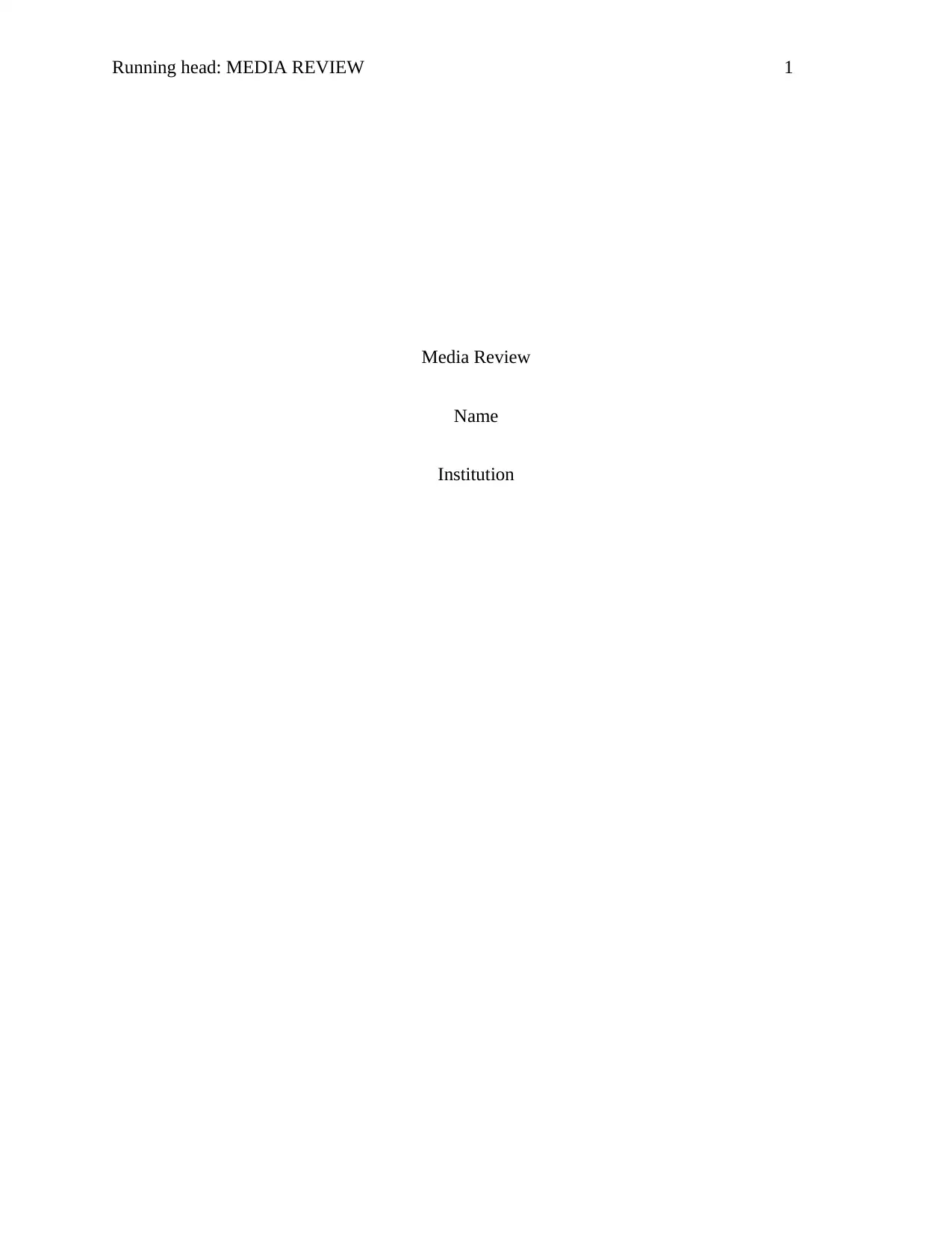
Running head: MEDIA REVIEW 1
Media Review
Name
Institution
Media Review
Name
Institution
Paraphrase This Document
Need a fresh take? Get an instant paraphrase of this document with our AI Paraphraser
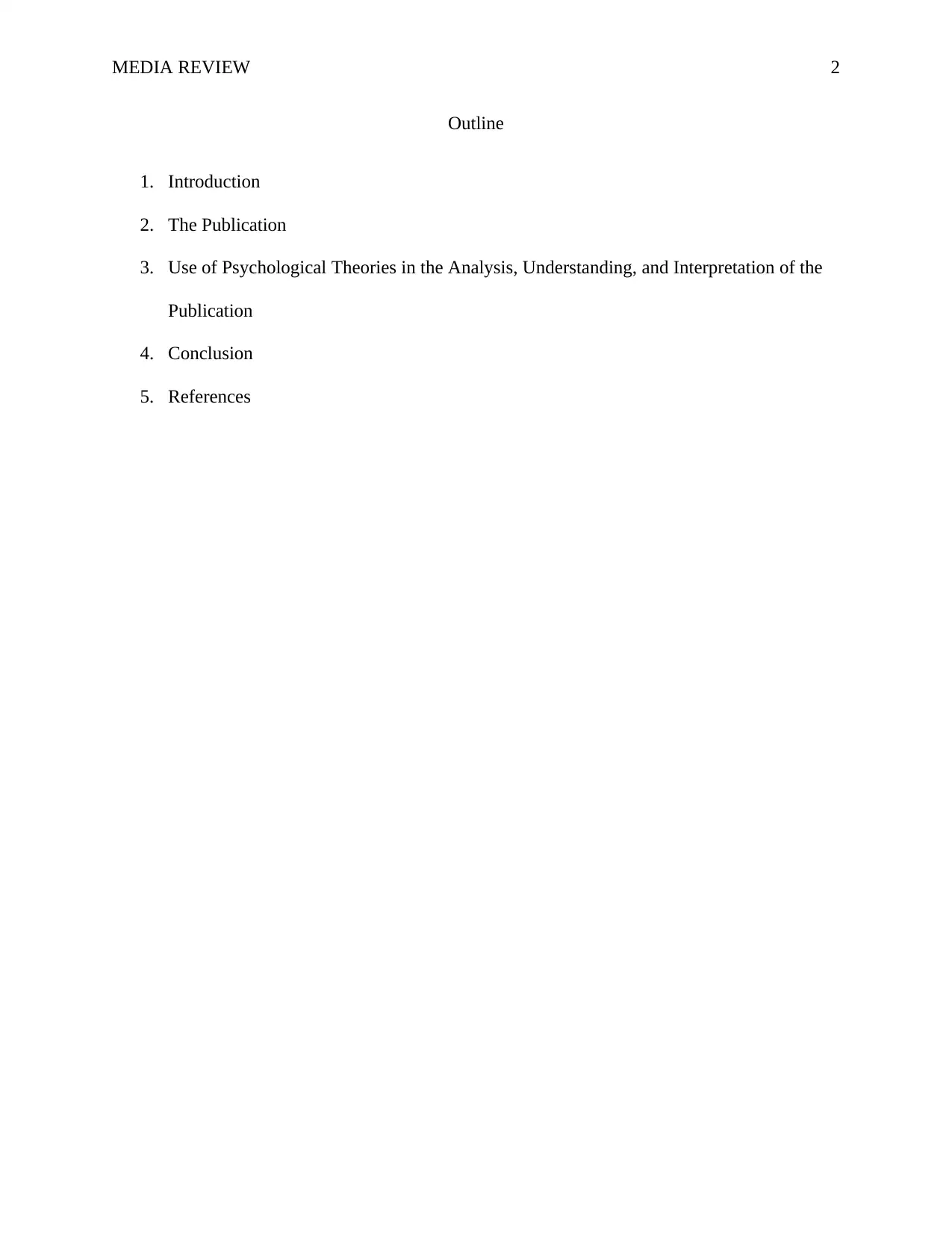
MEDIA REVIEW 2
Outline
1. Introduction
2. The Publication
3. Use of Psychological Theories in the Analysis, Understanding, and Interpretation of the
Publication
4. Conclusion
5. References
Outline
1. Introduction
2. The Publication
3. Use of Psychological Theories in the Analysis, Understanding, and Interpretation of the
Publication
4. Conclusion
5. References
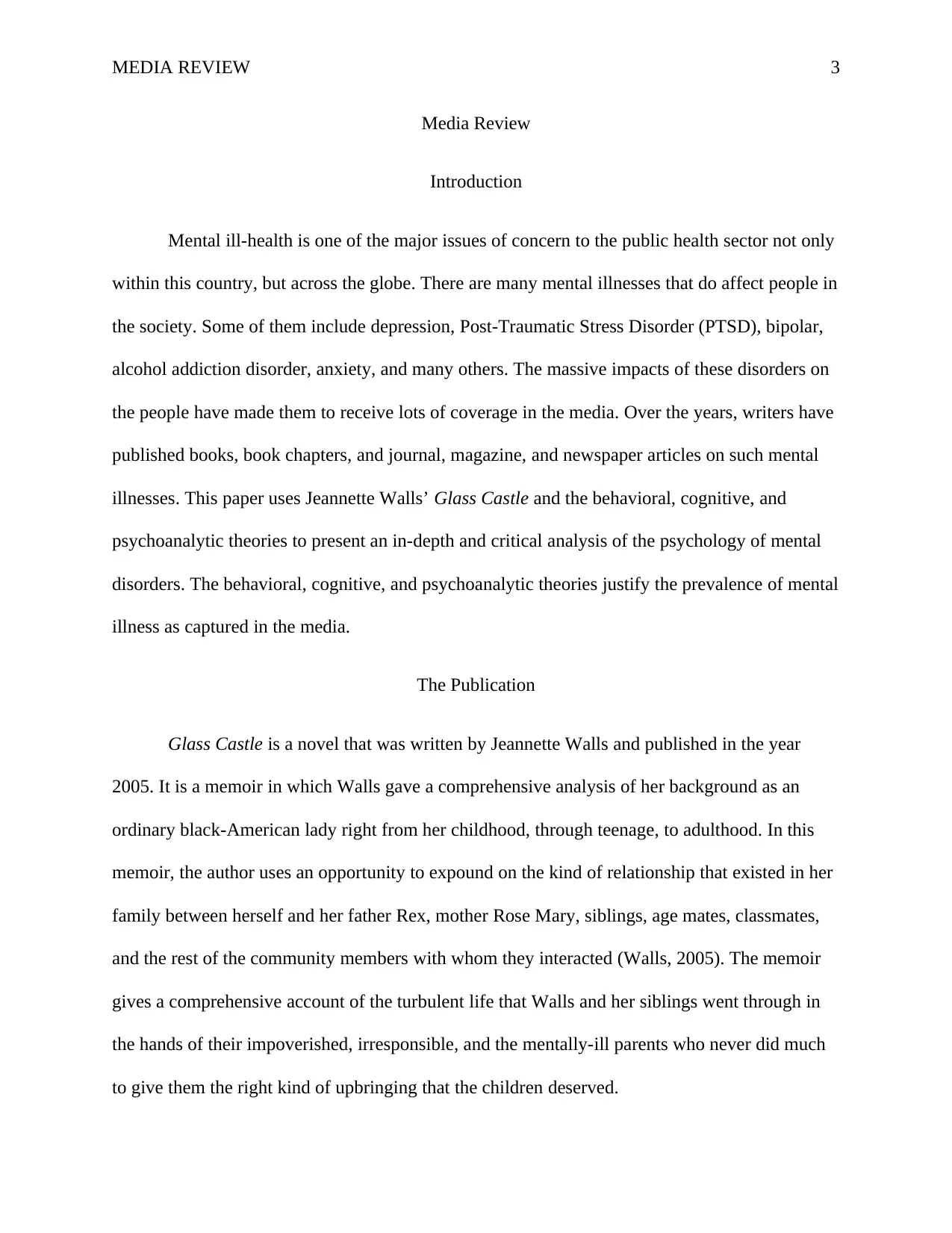
MEDIA REVIEW 3
Media Review
Introduction
Mental ill-health is one of the major issues of concern to the public health sector not only
within this country, but across the globe. There are many mental illnesses that do affect people in
the society. Some of them include depression, Post-Traumatic Stress Disorder (PTSD), bipolar,
alcohol addiction disorder, anxiety, and many others. The massive impacts of these disorders on
the people have made them to receive lots of coverage in the media. Over the years, writers have
published books, book chapters, and journal, magazine, and newspaper articles on such mental
illnesses. This paper uses Jeannette Walls’ Glass Castle and the behavioral, cognitive, and
psychoanalytic theories to present an in-depth and critical analysis of the psychology of mental
disorders. The behavioral, cognitive, and psychoanalytic theories justify the prevalence of mental
illness as captured in the media.
The Publication
Glass Castle is a novel that was written by Jeannette Walls and published in the year
2005. It is a memoir in which Walls gave a comprehensive analysis of her background as an
ordinary black-American lady right from her childhood, through teenage, to adulthood. In this
memoir, the author uses an opportunity to expound on the kind of relationship that existed in her
family between herself and her father Rex, mother Rose Mary, siblings, age mates, classmates,
and the rest of the community members with whom they interacted (Walls, 2005). The memoir
gives a comprehensive account of the turbulent life that Walls and her siblings went through in
the hands of their impoverished, irresponsible, and the mentally-ill parents who never did much
to give them the right kind of upbringing that the children deserved.
Media Review
Introduction
Mental ill-health is one of the major issues of concern to the public health sector not only
within this country, but across the globe. There are many mental illnesses that do affect people in
the society. Some of them include depression, Post-Traumatic Stress Disorder (PTSD), bipolar,
alcohol addiction disorder, anxiety, and many others. The massive impacts of these disorders on
the people have made them to receive lots of coverage in the media. Over the years, writers have
published books, book chapters, and journal, magazine, and newspaper articles on such mental
illnesses. This paper uses Jeannette Walls’ Glass Castle and the behavioral, cognitive, and
psychoanalytic theories to present an in-depth and critical analysis of the psychology of mental
disorders. The behavioral, cognitive, and psychoanalytic theories justify the prevalence of mental
illness as captured in the media.
The Publication
Glass Castle is a novel that was written by Jeannette Walls and published in the year
2005. It is a memoir in which Walls gave a comprehensive analysis of her background as an
ordinary black-American lady right from her childhood, through teenage, to adulthood. In this
memoir, the author uses an opportunity to expound on the kind of relationship that existed in her
family between herself and her father Rex, mother Rose Mary, siblings, age mates, classmates,
and the rest of the community members with whom they interacted (Walls, 2005). The memoir
gives a comprehensive account of the turbulent life that Walls and her siblings went through in
the hands of their impoverished, irresponsible, and the mentally-ill parents who never did much
to give them the right kind of upbringing that the children deserved.
⊘ This is a preview!⊘
Do you want full access?
Subscribe today to unlock all pages.

Trusted by 1+ million students worldwide
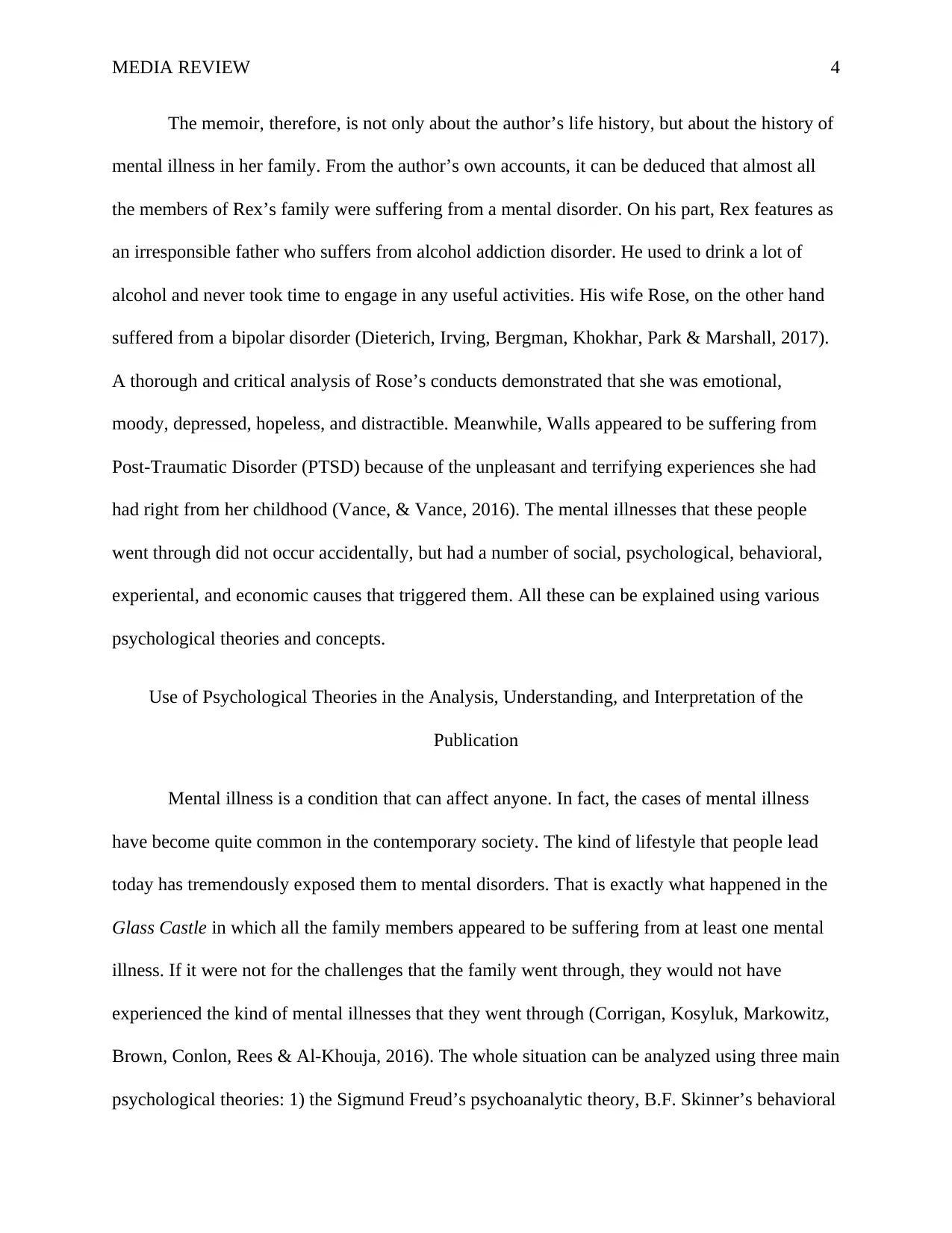
MEDIA REVIEW 4
The memoir, therefore, is not only about the author’s life history, but about the history of
mental illness in her family. From the author’s own accounts, it can be deduced that almost all
the members of Rex’s family were suffering from a mental disorder. On his part, Rex features as
an irresponsible father who suffers from alcohol addiction disorder. He used to drink a lot of
alcohol and never took time to engage in any useful activities. His wife Rose, on the other hand
suffered from a bipolar disorder (Dieterich, Irving, Bergman, Khokhar, Park & Marshall, 2017).
A thorough and critical analysis of Rose’s conducts demonstrated that she was emotional,
moody, depressed, hopeless, and distractible. Meanwhile, Walls appeared to be suffering from
Post-Traumatic Disorder (PTSD) because of the unpleasant and terrifying experiences she had
had right from her childhood (Vance, & Vance, 2016). The mental illnesses that these people
went through did not occur accidentally, but had a number of social, psychological, behavioral,
experiental, and economic causes that triggered them. All these can be explained using various
psychological theories and concepts.
Use of Psychological Theories in the Analysis, Understanding, and Interpretation of the
Publication
Mental illness is a condition that can affect anyone. In fact, the cases of mental illness
have become quite common in the contemporary society. The kind of lifestyle that people lead
today has tremendously exposed them to mental disorders. That is exactly what happened in the
Glass Castle in which all the family members appeared to be suffering from at least one mental
illness. If it were not for the challenges that the family went through, they would not have
experienced the kind of mental illnesses that they went through (Corrigan, Kosyluk, Markowitz,
Brown, Conlon, Rees & Al-Khouja, 2016). The whole situation can be analyzed using three main
psychological theories: 1) the Sigmund Freud’s psychoanalytic theory, B.F. Skinner’s behavioral
The memoir, therefore, is not only about the author’s life history, but about the history of
mental illness in her family. From the author’s own accounts, it can be deduced that almost all
the members of Rex’s family were suffering from a mental disorder. On his part, Rex features as
an irresponsible father who suffers from alcohol addiction disorder. He used to drink a lot of
alcohol and never took time to engage in any useful activities. His wife Rose, on the other hand
suffered from a bipolar disorder (Dieterich, Irving, Bergman, Khokhar, Park & Marshall, 2017).
A thorough and critical analysis of Rose’s conducts demonstrated that she was emotional,
moody, depressed, hopeless, and distractible. Meanwhile, Walls appeared to be suffering from
Post-Traumatic Disorder (PTSD) because of the unpleasant and terrifying experiences she had
had right from her childhood (Vance, & Vance, 2016). The mental illnesses that these people
went through did not occur accidentally, but had a number of social, psychological, behavioral,
experiental, and economic causes that triggered them. All these can be explained using various
psychological theories and concepts.
Use of Psychological Theories in the Analysis, Understanding, and Interpretation of the
Publication
Mental illness is a condition that can affect anyone. In fact, the cases of mental illness
have become quite common in the contemporary society. The kind of lifestyle that people lead
today has tremendously exposed them to mental disorders. That is exactly what happened in the
Glass Castle in which all the family members appeared to be suffering from at least one mental
illness. If it were not for the challenges that the family went through, they would not have
experienced the kind of mental illnesses that they went through (Corrigan, Kosyluk, Markowitz,
Brown, Conlon, Rees & Al-Khouja, 2016). The whole situation can be analyzed using three main
psychological theories: 1) the Sigmund Freud’s psychoanalytic theory, B.F. Skinner’s behavioral
Paraphrase This Document
Need a fresh take? Get an instant paraphrase of this document with our AI Paraphraser
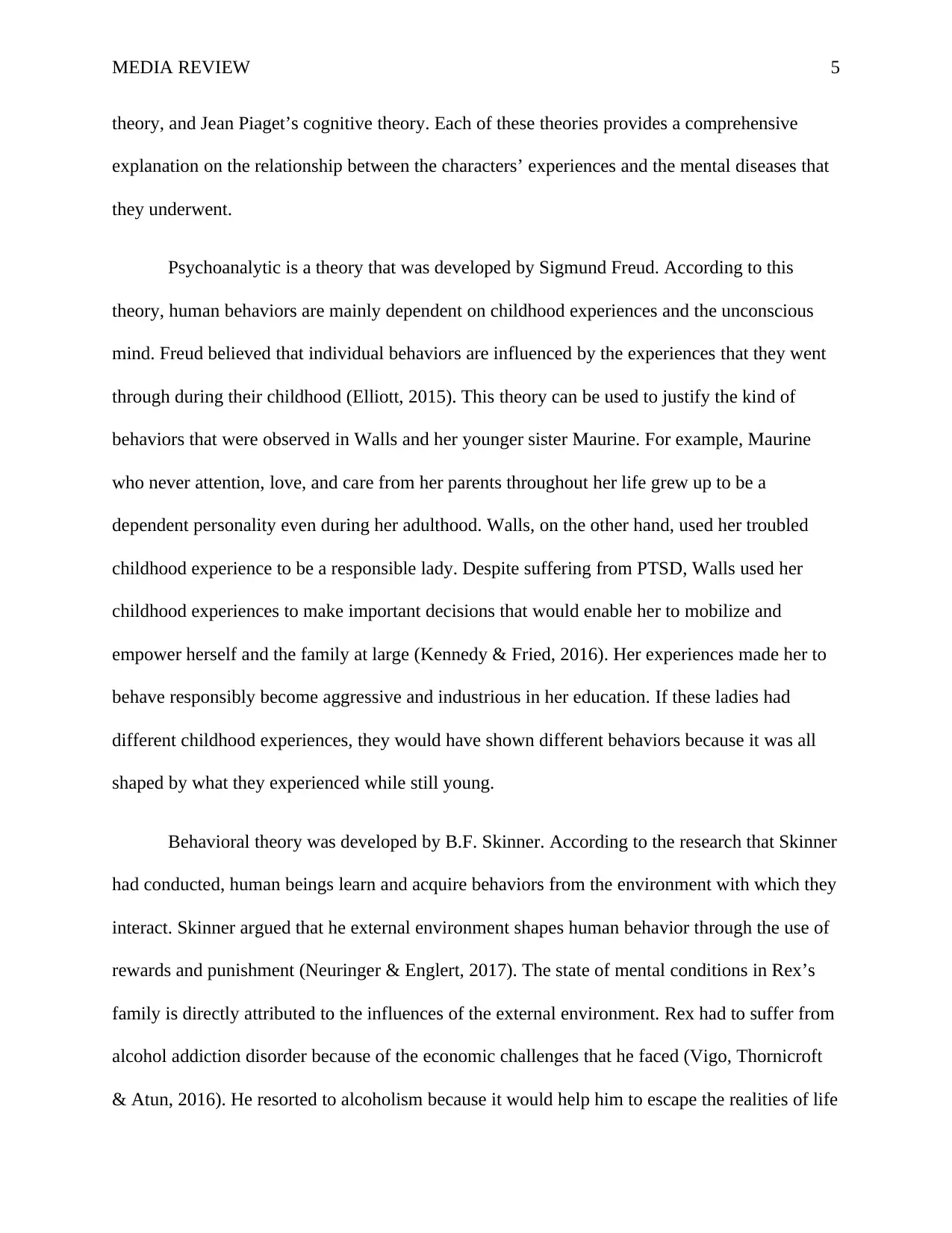
MEDIA REVIEW 5
theory, and Jean Piaget’s cognitive theory. Each of these theories provides a comprehensive
explanation on the relationship between the characters’ experiences and the mental diseases that
they underwent.
Psychoanalytic is a theory that was developed by Sigmund Freud. According to this
theory, human behaviors are mainly dependent on childhood experiences and the unconscious
mind. Freud believed that individual behaviors are influenced by the experiences that they went
through during their childhood (Elliott, 2015). This theory can be used to justify the kind of
behaviors that were observed in Walls and her younger sister Maurine. For example, Maurine
who never attention, love, and care from her parents throughout her life grew up to be a
dependent personality even during her adulthood. Walls, on the other hand, used her troubled
childhood experience to be a responsible lady. Despite suffering from PTSD, Walls used her
childhood experiences to make important decisions that would enable her to mobilize and
empower herself and the family at large (Kennedy & Fried, 2016). Her experiences made her to
behave responsibly become aggressive and industrious in her education. If these ladies had
different childhood experiences, they would have shown different behaviors because it was all
shaped by what they experienced while still young.
Behavioral theory was developed by B.F. Skinner. According to the research that Skinner
had conducted, human beings learn and acquire behaviors from the environment with which they
interact. Skinner argued that he external environment shapes human behavior through the use of
rewards and punishment (Neuringer & Englert, 2017). The state of mental conditions in Rex’s
family is directly attributed to the influences of the external environment. Rex had to suffer from
alcohol addiction disorder because of the economic challenges that he faced (Vigo, Thornicroft
& Atun, 2016). He resorted to alcoholism because it would help him to escape the realities of life
theory, and Jean Piaget’s cognitive theory. Each of these theories provides a comprehensive
explanation on the relationship between the characters’ experiences and the mental diseases that
they underwent.
Psychoanalytic is a theory that was developed by Sigmund Freud. According to this
theory, human behaviors are mainly dependent on childhood experiences and the unconscious
mind. Freud believed that individual behaviors are influenced by the experiences that they went
through during their childhood (Elliott, 2015). This theory can be used to justify the kind of
behaviors that were observed in Walls and her younger sister Maurine. For example, Maurine
who never attention, love, and care from her parents throughout her life grew up to be a
dependent personality even during her adulthood. Walls, on the other hand, used her troubled
childhood experience to be a responsible lady. Despite suffering from PTSD, Walls used her
childhood experiences to make important decisions that would enable her to mobilize and
empower herself and the family at large (Kennedy & Fried, 2016). Her experiences made her to
behave responsibly become aggressive and industrious in her education. If these ladies had
different childhood experiences, they would have shown different behaviors because it was all
shaped by what they experienced while still young.
Behavioral theory was developed by B.F. Skinner. According to the research that Skinner
had conducted, human beings learn and acquire behaviors from the environment with which they
interact. Skinner argued that he external environment shapes human behavior through the use of
rewards and punishment (Neuringer & Englert, 2017). The state of mental conditions in Rex’s
family is directly attributed to the influences of the external environment. Rex had to suffer from
alcohol addiction disorder because of the economic challenges that he faced (Vigo, Thornicroft
& Atun, 2016). He resorted to alcoholism because it would help him to escape the realities of life
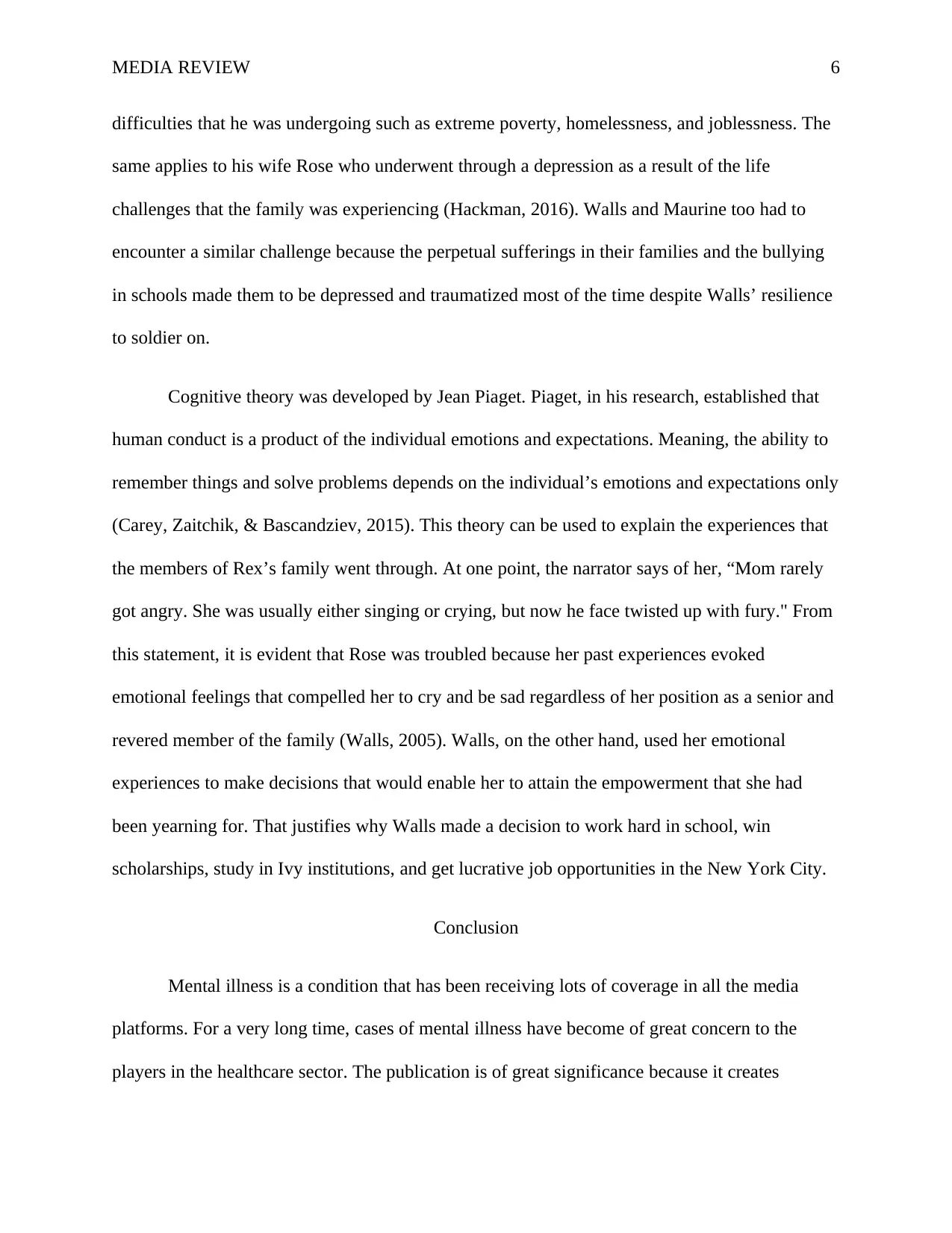
MEDIA REVIEW 6
difficulties that he was undergoing such as extreme poverty, homelessness, and joblessness. The
same applies to his wife Rose who underwent through a depression as a result of the life
challenges that the family was experiencing (Hackman, 2016). Walls and Maurine too had to
encounter a similar challenge because the perpetual sufferings in their families and the bullying
in schools made them to be depressed and traumatized most of the time despite Walls’ resilience
to soldier on.
Cognitive theory was developed by Jean Piaget. Piaget, in his research, established that
human conduct is a product of the individual emotions and expectations. Meaning, the ability to
remember things and solve problems depends on the individual’s emotions and expectations only
(Carey, Zaitchik, & Bascandziev, 2015). This theory can be used to explain the experiences that
the members of Rex’s family went through. At one point, the narrator says of her, “Mom rarely
got angry. She was usually either singing or crying, but now he face twisted up with fury." From
this statement, it is evident that Rose was troubled because her past experiences evoked
emotional feelings that compelled her to cry and be sad regardless of her position as a senior and
revered member of the family (Walls, 2005). Walls, on the other hand, used her emotional
experiences to make decisions that would enable her to attain the empowerment that she had
been yearning for. That justifies why Walls made a decision to work hard in school, win
scholarships, study in Ivy institutions, and get lucrative job opportunities in the New York City.
Conclusion
Mental illness is a condition that has been receiving lots of coverage in all the media
platforms. For a very long time, cases of mental illness have become of great concern to the
players in the healthcare sector. The publication is of great significance because it creates
difficulties that he was undergoing such as extreme poverty, homelessness, and joblessness. The
same applies to his wife Rose who underwent through a depression as a result of the life
challenges that the family was experiencing (Hackman, 2016). Walls and Maurine too had to
encounter a similar challenge because the perpetual sufferings in their families and the bullying
in schools made them to be depressed and traumatized most of the time despite Walls’ resilience
to soldier on.
Cognitive theory was developed by Jean Piaget. Piaget, in his research, established that
human conduct is a product of the individual emotions and expectations. Meaning, the ability to
remember things and solve problems depends on the individual’s emotions and expectations only
(Carey, Zaitchik, & Bascandziev, 2015). This theory can be used to explain the experiences that
the members of Rex’s family went through. At one point, the narrator says of her, “Mom rarely
got angry. She was usually either singing or crying, but now he face twisted up with fury." From
this statement, it is evident that Rose was troubled because her past experiences evoked
emotional feelings that compelled her to cry and be sad regardless of her position as a senior and
revered member of the family (Walls, 2005). Walls, on the other hand, used her emotional
experiences to make decisions that would enable her to attain the empowerment that she had
been yearning for. That justifies why Walls made a decision to work hard in school, win
scholarships, study in Ivy institutions, and get lucrative job opportunities in the New York City.
Conclusion
Mental illness is a condition that has been receiving lots of coverage in all the media
platforms. For a very long time, cases of mental illness have become of great concern to the
players in the healthcare sector. The publication is of great significance because it creates
⊘ This is a preview!⊘
Do you want full access?
Subscribe today to unlock all pages.

Trusted by 1+ million students worldwide
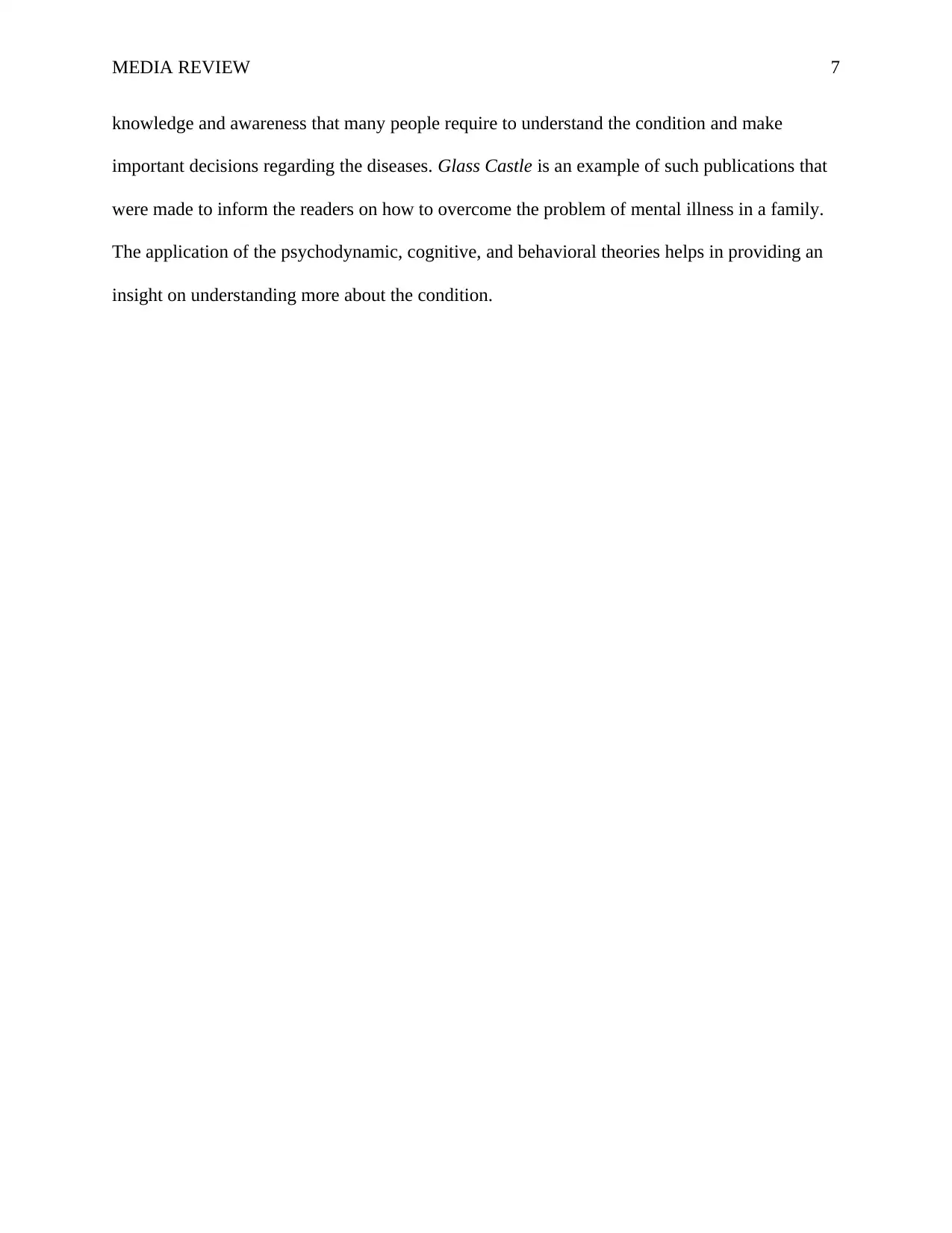
MEDIA REVIEW 7
knowledge and awareness that many people require to understand the condition and make
important decisions regarding the diseases. Glass Castle is an example of such publications that
were made to inform the readers on how to overcome the problem of mental illness in a family.
The application of the psychodynamic, cognitive, and behavioral theories helps in providing an
insight on understanding more about the condition.
knowledge and awareness that many people require to understand the condition and make
important decisions regarding the diseases. Glass Castle is an example of such publications that
were made to inform the readers on how to overcome the problem of mental illness in a family.
The application of the psychodynamic, cognitive, and behavioral theories helps in providing an
insight on understanding more about the condition.
Paraphrase This Document
Need a fresh take? Get an instant paraphrase of this document with our AI Paraphraser
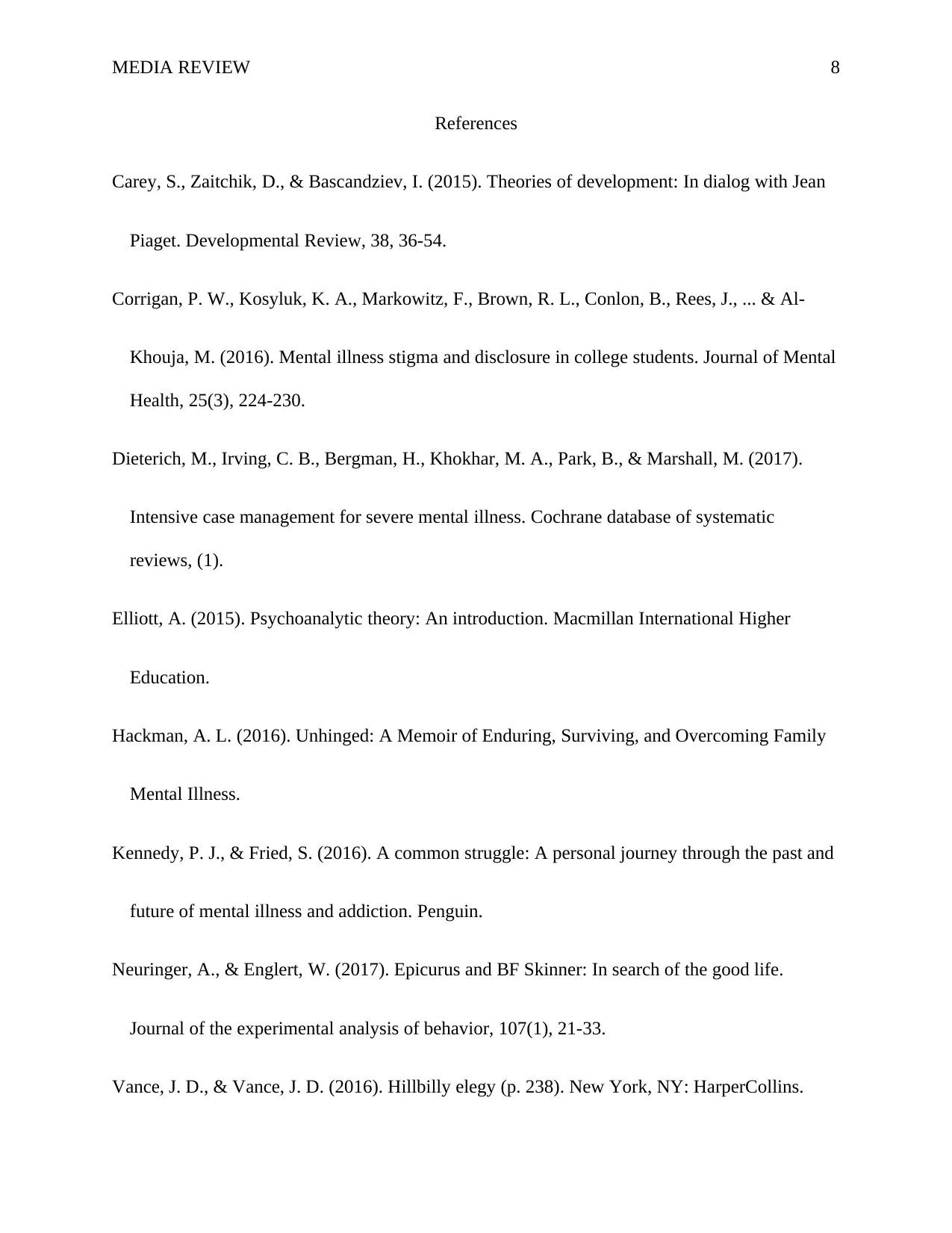
MEDIA REVIEW 8
References
Carey, S., Zaitchik, D., & Bascandziev, I. (2015). Theories of development: In dialog with Jean
Piaget. Developmental Review, 38, 36-54.
Corrigan, P. W., Kosyluk, K. A., Markowitz, F., Brown, R. L., Conlon, B., Rees, J., ... & Al-
Khouja, M. (2016). Mental illness stigma and disclosure in college students. Journal of Mental
Health, 25(3), 224-230.
Dieterich, M., Irving, C. B., Bergman, H., Khokhar, M. A., Park, B., & Marshall, M. (2017).
Intensive case management for severe mental illness. Cochrane database of systematic
reviews, (1).
Elliott, A. (2015). Psychoanalytic theory: An introduction. Macmillan International Higher
Education.
Hackman, A. L. (2016). Unhinged: A Memoir of Enduring, Surviving, and Overcoming Family
Mental Illness.
Kennedy, P. J., & Fried, S. (2016). A common struggle: A personal journey through the past and
future of mental illness and addiction. Penguin.
Neuringer, A., & Englert, W. (2017). Epicurus and BF Skinner: In search of the good life.
Journal of the experimental analysis of behavior, 107(1), 21-33.
Vance, J. D., & Vance, J. D. (2016). Hillbilly elegy (p. 238). New York, NY: HarperCollins.
References
Carey, S., Zaitchik, D., & Bascandziev, I. (2015). Theories of development: In dialog with Jean
Piaget. Developmental Review, 38, 36-54.
Corrigan, P. W., Kosyluk, K. A., Markowitz, F., Brown, R. L., Conlon, B., Rees, J., ... & Al-
Khouja, M. (2016). Mental illness stigma and disclosure in college students. Journal of Mental
Health, 25(3), 224-230.
Dieterich, M., Irving, C. B., Bergman, H., Khokhar, M. A., Park, B., & Marshall, M. (2017).
Intensive case management for severe mental illness. Cochrane database of systematic
reviews, (1).
Elliott, A. (2015). Psychoanalytic theory: An introduction. Macmillan International Higher
Education.
Hackman, A. L. (2016). Unhinged: A Memoir of Enduring, Surviving, and Overcoming Family
Mental Illness.
Kennedy, P. J., & Fried, S. (2016). A common struggle: A personal journey through the past and
future of mental illness and addiction. Penguin.
Neuringer, A., & Englert, W. (2017). Epicurus and BF Skinner: In search of the good life.
Journal of the experimental analysis of behavior, 107(1), 21-33.
Vance, J. D., & Vance, J. D. (2016). Hillbilly elegy (p. 238). New York, NY: HarperCollins.
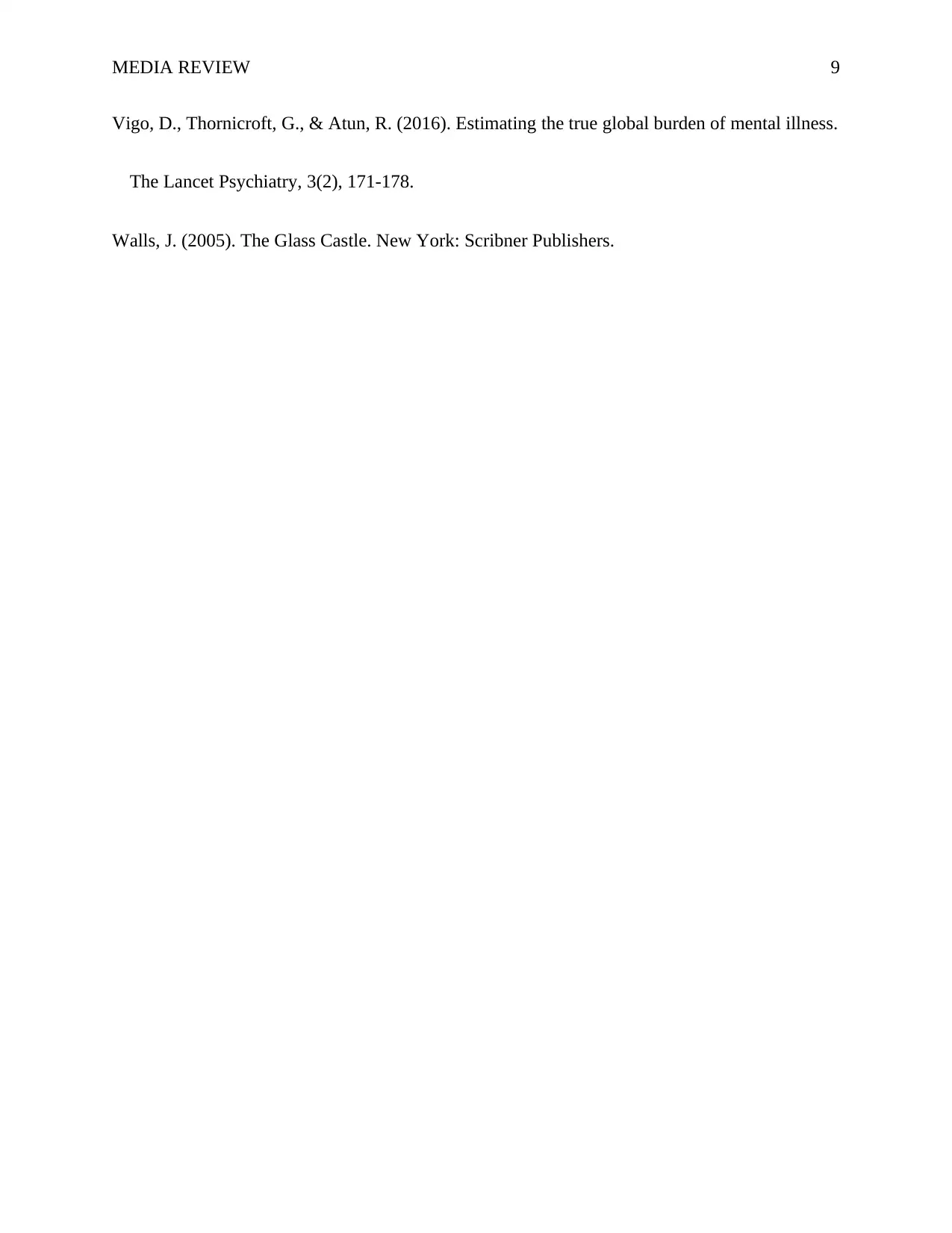
MEDIA REVIEW 9
Vigo, D., Thornicroft, G., & Atun, R. (2016). Estimating the true global burden of mental illness.
The Lancet Psychiatry, 3(2), 171-178.
Walls, J. (2005). The Glass Castle. New York: Scribner Publishers.
Vigo, D., Thornicroft, G., & Atun, R. (2016). Estimating the true global burden of mental illness.
The Lancet Psychiatry, 3(2), 171-178.
Walls, J. (2005). The Glass Castle. New York: Scribner Publishers.
⊘ This is a preview!⊘
Do you want full access?
Subscribe today to unlock all pages.

Trusted by 1+ million students worldwide
1 out of 9
Your All-in-One AI-Powered Toolkit for Academic Success.
+13062052269
info@desklib.com
Available 24*7 on WhatsApp / Email
![[object Object]](/_next/static/media/star-bottom.7253800d.svg)
Unlock your academic potential
Copyright © 2020–2026 A2Z Services. All Rights Reserved. Developed and managed by ZUCOL.
